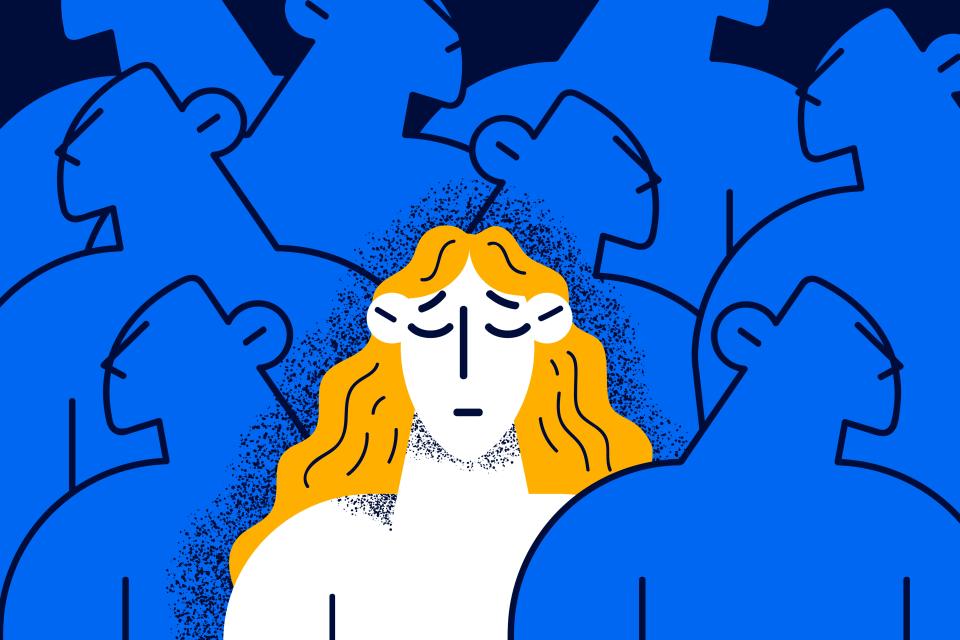What is an empath? Expert explains the personality type and how to know if you are one.
You may have heard someone, whether they be in your personal life or on social media, describe themselves as an "empath." But what exactly is an empath?
According to Merriam-Webster, empathy is defined as "the action of understanding, being aware of, being sensitive to, and vicariously experiencing the feelings, thoughts, and experience of another of either the past or present without having the feelings, thoughts, and experience fully communicated in an objectively explicit manner."
Maybe you have even felt a heightened awareness to the emotions of those around you, but does this make you an empath? Here is what you need to know about empaths, including traits.
Just curious: We're here to answer life's everyday questions
What is anempath?
An empath can be described as "an individual who is deeply aware and affected by the emotional state of other people," said Ramani Durvasula, a clinical psychologist and author.
Empaths may feel as if they are "absorbing other people's energy," taking on the emotional state of another person when they themselves have not experienced the scenario or content, Durvasula said.
For instance, an empath is more likely to dwell on a story about personal suffering, having an emotional reaction and potentially intervening in some way and providing assistance to someone who's experiencing a time of difficulty.
On the flip side, Durvasula said, "An empath will feel tremendous joy for another person when they're going through a joyful experience, even if, at the time, the empath may not be in such a great place themselves."
What is gaslighting? How to notice and address the behavior in your peers.
'Echoists' are prone to narcissistic, emotionally abusive relationships. Is this you?

What are the signs of an empath?
"Empath" is not a clinical term, Durvasula said. "In psychology, I think it's one of those pop terms that has boiled into how people frame people."
Some traits associated with empaths include:
Agreeableness
High awareness for others' emotions
High awareness of their own emotions and how they impa others
Being an empath is on a continuum, so some people may experience the effects of these characteristics more than others.
For empaths on the lower end, they are still agreeable and aware of those around them, caring deeply about others and putting themselves in someone else's situation. Empaths on the high end are more at risk for putting themselves in harm's way to be present for another person, said Durvasula.
"They may put themselves in financial harm. They may ignore some very clear red flags because the person told them a very painful backstory — 'I can't walk out onthis person' — and could even be at risk for remaining in a situation that could be emotionally or even physically abusive," she said.
Empaths also may be more vulnerable to exhaustion from these heightened emotions, said Durvasula. "They feel so much of other people's pain that you will see they'll get deeply affected," she said. "If getting deeply affected, you're going to also get wrung out." This could lead to physical or emotional exhaustion and even, in extreme cases, physical illness.
In addition to feeling the heightened emotions of others, empaths are very self-aware of how their own behavior affects those around them.
"They're very careful in how they speak and how they conduct themselves," said Durvasula. "The true empath, if it was truly to be viewed as in a more clinical realm, is that person is also very, very closely self-monitored and very self-aware in how they interact with other people."
Are you too nice? Here's when that's a problem
What is the opposite of an empath?
While some people may experience high empathy for others, there are people who do not. The opposite of an empath is a narcissist, psychopath or sociopath, said Durvasula. Unlike being an empath, these are all clinical diagnoses.
"These are people who are very callous, who view people as objects to satisfy their needs," she said. "They are of no interest in people's emotional worlds unless it's something they can capitalize on for their own profit or pleasure."
These individuals are not self-aware and say and do what they want with little regard for how it affects other people, unlike empaths. They can be entitled, exploitative and manipulative, using others to achieve their goals without care for how it can potentially harm someone.
Narcissistic personality disorder only affects an estimated 1% of the population.But, all of these personality disorders share a lack of or very little empathy for other people, said Durvasula.
"What little empathy we do see is usually performative," she said. "They'll pretend to be empathic to get the thing that they need."
How do I know if someone in my life is a narcissist? Here's what it is – and what it isn't

What are some misconceptions about empaths?
With constant information (and misinformation) spread via social media apps, such as TikTok, there may be some confusion on what empaths are, Durvasula said.
Often times, people confuse empathy with sympathy, which is the awareness and offering of comfort at a time of suffering to another person. Unlike empathy, sympathy is being present with the emotional state of someone else whether it be good, bad or indifferent.
"To me, being an empath: it's a two-way street," said Durvasula. "It's not only that you feel deeply, but that you're also so self-reflective and self-aware."
People may call themselves empaths, but do not follow through on being attune to how their actions impact others. "There's these people on social media that say, 'I'm such an empath...I feel,' but then you'll see that person lash out at somebody in a rather cruel way," said Durvasula, adding that these people will claim the lashing out is because they care deeply.
"There's absolutely no regard for that other person," she said. "If you're an empath, you're an empath to everybody. So, even if somebody is unkind, you still find an approach that shows some awareness that that other human being, whether you believe it or not, does have emotions and feelings that could be heard."
Advice for empaths
For empaths, Durvasula shared how important it is to slow down and care for yourself just as much as you want to care for others.
"I would say to people who are hyper-empathic, or self-identify as empaths, slow down, read the situation, watch the person's behavior," she said.
In these instances, you can make sure you are not getting taken advantage of or being put at risk. Additionally, empathy cannot change toxic people. "At this point, you're throwing good money after bad," said Durvasula.
Also, listen to those around you, especially those who aren't as empathetic. They can help gauge the situation from a different lens, preventing potential harm.
This article originally appeared on USA TODAY: What is an empath? How to know if you are one, expert explains
